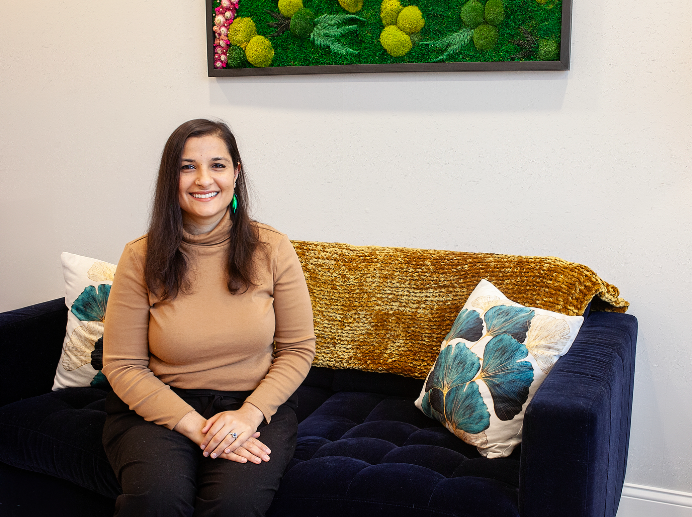Many people live with stress and anxiety daily, with reports showing that 19.1% of the US population over the age of 18 suffers from anxiety disorders. While there is a way to cope with an average, healthy amount of these negative feelings, if they go unresolved for too long, they can have significant consequences on a person’s health. The effects of prolonged, untreated stress and anxiety can range from mood conditions, such as depression and irritability, to physical issues, like increased blood pressure and cardiovascular conditions.
The importance of mental and physical balance
According to somatic psychotherapist Mariya Javed-Payne, founder of Awaken Consulting Services, negative feelings like stress and anxiety can cause imbalance, which can have adverse effects on an individual’s overall well-being.
“Bodies and minds function best when they are settled,” Javed-Payne explains. “This movement from unsettledness to equilibrium occurs most swiftly and powerfully when we are in connection and relationship, which helps us experience a sense of safety. Relating and attunement are the most powerful ways to settle our nervous systems and are deeply hard-wired in our brains. In this state, we can help our nervous system reconnect with itself and the world in present time and space.”
Javed-Payne formed Awaken Consulting Services to “guide others in meeting their healthiest selves.” To accomplish this goal, she uses brain and body-based approaches, such as Brainspotting, which can help heal trauma and restore one’s capacity to be their best, unique self. “Deep within, life is always seeking more of what nurtures itself,” Javed-Payne asserts.
What is brainspotting?
Brainspotting, one of the most potent tools in Javed-Payne’s arsenal, is a treatment method that allows the brain to identify, process, and release the core neuropsychological sources of pain, trauma, and a host of other challenging conditions and symptoms.
In the realm of psychosomatic treatment, which is becoming increasingly recognized for its efficacy, Brainspotting is a relatively novel approach — having only been introduced in 2003 — but has grown in popularity and practice thanks to its ability to help individuals confront difficult emotions and memories in a rapid yet contained process. Brainspotting has shown great potential both for patients for whom traditional therapy has proven ineffective in the past and for those for whom brainspotting is their first foray into psychosomatic treatment.
During the Brainspotting session, a therapist identifies activated eye positions known as “brainspots” through the client’s felt sense or the client’s reflexive responses, such as blinks, eye twitches or wobbles, pupil dilation, quick breaths, and subtle body shifts. In other words, certain fixed eye positions allow individuals to access their traumas and emotions. At this point, clients can use techniques like mindful awareness to help process these memories and emotions in the body with the attuned presence of the therapist guiding the process.
For some people, standard talk therapy or medical approaches are enough to manage their anxiety and stress. However, Brainspotting aims to heal anxiety rather than manage it by addressing the underlying trauma. One study on the efficacy of Brainspotting as a treatment method for severe post-traumatic stress disorder (PTSD) revealed that patients reported a high level of satisfaction and resolution with the results, compared to other forms of treatment, such as Eye Movement Desensitization and Reprocessing (EMDR).
How is brainspotting an effective tool to help individuals overcome trauma, anxiety, and stress?

Ultimately, brainspotting aims to heal a neuropsychological issue by addressing its root source. Rather than using cognitive thinking to access emotional issues, as is done in traditional talk therapy, Brainspotting uses these eye positions to access trauma stored in deeper portions of the brain, facilitating healing through a process of reorganization and memory reconsolidation.
“The key difference between talk therapy and somatic psychotherapies such as Brainspotting is understanding that emotions and traumas live in the deeper regions of the brain where our survival reflexes reside,” Javed-Payne explains, “while cognition is more in the frontal lobe where critical thinking, judgment, and analysis occur.”
With anxiety, stress, and trauma, communication between the thinking brain and the deep brain gets disrupted, which is why individuals suffering from these experiences often don’t understand why they don’t always feel better when they try to change their thoughts or alter their behavior. According to Javed-Payne, somatic psychotherapies aim to address dysregulation from a “bottom-up” approach vs “top-down,” meaning they access issues from their source — the deep brain and the body — versus the thinking brain.
“Brainspotting provides therapists and healers with powerful tools to enable individuals to quickly and effectively process through the deep brain sources of many held traumas, emotional, somatic and performance problems,” conveys Javed-Payne, who teaches Brainspotting trainings worldwide, including the inception of Brainspotting in her home country of India earlier this year. She has immersed and guided hundreds of clinicians in this new modality, centering a message of hope: that each brain and body has the power for restoration and healing when given supportive conditions.
Awaken Consulting Services also offers intensive sessions that pair brainspotting therapy with cannabis or ketamine treatment. As a proponent of utilizing psychedelic medicines responsibly, this powerful therapeutic combination allows clients to engage in issues that may be too complex or longstanding to resolve in regular weekly therapy, such as complex PTSD, substance use or addiction, grief, racial and generational trauma, severe anxiety and depression, and more. With 4-5 hour long sessions a day, over multiple days, an intensive provides a tailored approach and ample space for clients to transform.
Brainspotting may not be for everyone, as accessing these deep traumas and memories can be emotionally painful for some. However, many of Javed-Payne’s clients have experienced great success in overcoming these painful emotions through her unique approach to psychosomatic therapy — so much so that she currently has a waitlist through the middle of 2024 for her counseling services and intensives.
-Javed-Payne passionately trains clinicians each year in Brainspotting and somatic approaches to offer this reach. This success is a testament to her commitment to helping people find their authentic path to wellness. She hopes to shift her passion and vision of providing direct therapy towards the expansion of Brainspotting and other psychosomatic modalities through the training of other practitioners and clinicians. The importance and freedom of deep-level healing for clients will come from the evolution of mind and body modalities to provide true transformation and a journey to wholeness.



